Fleurs du Mal Magazine


A series of disruptive, unnerving sounds haunts the fictional writings of Franz Kafka.
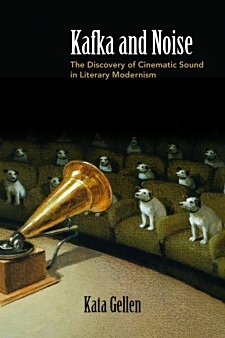 These include the painful squeak in Gregor Samsa’s voice, the indeterminate whistling of Josefine the singer, the relentless noise in “The Burrow,” and telephonic disturbances in The Castle.
These include the painful squeak in Gregor Samsa’s voice, the indeterminate whistling of Josefine the singer, the relentless noise in “The Burrow,” and telephonic disturbances in The Castle.
In Kafka and Noise, Kata Gellen applies concepts and vocabulary from film theory to Kafka’s works in order to account for these unsettling sounds. Rather than try to decode these noises, Gellen explores the complex role they play in Kafka’s larger project.
Kafka and Noise offers a method for pursuing intermedial research in the humanities—namely, via the productive “misapplication” of theoretical tools, which exposes the contours, conditions, and expressive possibilities of the media in question. This book will be of interest to scholars of modernism, literature, cinema, and sound, as well as to anyone wishing to explore how artistic and technological media shape our experience of the world and the possibilities for representing it.
Kata Gellen is an assistant professor in the Department of Germanic Languages and Literature at Duke University.
Kata Gellen (Author)
Kafka and Noise.
The Discovery of Cinematic Sound in Literary Modernism
272 pages
Northwestern University Press
Literary Criticism
Cloth Text – $99.95
ISBN 978-0-8101-3894-0
Paper Text – $34.95
ISBN 978-0-8101-3893-3
Publication Date: January 2019
# new books
The Discovery of Cinematic Sound in Literary Modernism
fleursdumal.nl magazine
More in: # Music Archive, #Archive A-Z Sound Poetry, #Archive Concrete & Visual Poetry, *Concrete + Visual Poetry K-O, - Book News, - Bookstores, Archive G-H, Archive K-L, Art & Literature News, Franz Kafka, Kafka, Franz, Kafka, Franz, Modernisme
Before the era of fake news and anti-fascists, William S. Burroughs wrote about preparing for revolution and confronting institutionalized power.
 In this work, Burroughs’ parody becomes a set of rationales and instructions for destabilizing the state and overthrowing an oppressive and corrupt government. As with much of Burroughs’ work, it is hard to say if it is serious or purely satire. The work is funny, horrifying, and eerily prescient, especially concerning the use of language and social media to undermine institutions.
In this work, Burroughs’ parody becomes a set of rationales and instructions for destabilizing the state and overthrowing an oppressive and corrupt government. As with much of Burroughs’ work, it is hard to say if it is serious or purely satire. The work is funny, horrifying, and eerily prescient, especially concerning the use of language and social media to undermine institutions.
The Revised Boy Scout Manual was a work Burroughs revisited many times, but which has never before been published in its complete form.
Based primarily on recordings of a performance of the complete piece found in the archives at the OSU libraries, as well as various incomplete versions of the typescript found at Arizona State University and the New York Public Library archives, this lost masterpiece of satiric subversion is finally available in its entirety.
“He’s up there with the pope . . . you can’t revere him enough . . . he’s the greatest mind of our times.” — Patti Smith
“Well, he’s a writer.” —Samuel Beckett
“The Revised Boy Scout Manual offers easy-to-read proof that the uncensored human imagination allowed to freely extrapolate about future social change can offer outrageous scenarios and fresh language capable of inspiring readers decades into the future.” —V. Vale, founder and publisher of RE/Search
The Revised Boy Scout Manual
An Electronic Revolution
by William S. Burroughs
Edited by John M. Bennett, Geoffrey D. Smith
Publisher Ohio State University Press
Language: English
Format Paperback
Nb of pages: 144
ISBN-10 0814254896
ISBN-13 9780814254899
Publication 01 September 2018
$12.65
# new books
William S. Burroughs
The Revised Boy Scout Manual
fleursdumal.nl magazine
More in: #Beat Generation Archives, - Book News, Archive A-B, Art & Literature News, AUDIO, CINEMA, RADIO & TV, Burroughs, William S., Conceptual writing, Samuel Beckett, Smith, Patti
Tijger grijpt de punterstok om de boot uit het riet te houden. Grootvader Bernhard staat voor zijn molenhuis en zwaait hen na.
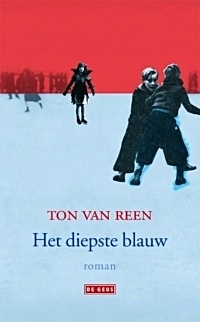 `Je zult zelf zien dat de Chinezen op hun handen lopen’, roept hij. `Ze eten met hun voeten.’
`Je zult zelf zien dat de Chinezen op hun handen lopen’, roept hij. `Ze eten met hun voeten.’
`Ik stuur u een kaart van het paleis van de keizer’, roept Mels.
Hij roeit. Hij roeit altijd. De taken zijn verdeeld. Tijger is stuurman en piloot.
Iemand moet de leiding hebben. Dat is altijd Tijger. Tijger die op de kracht van Mels vertrouwt. Mels is matroos en machinist tegelijk. Het roeien gaat hem makkelijk af. Hij hoeft zich nauwelijks in te spannen. Het water in de Wijer staat hoog en stroomt flink, alsof het haast heeft zich onder de brug door te wurmen en uit het dorp weg te komen. De boot gaat als vanzelf.
`Moet je zien hoeveel mensen ons uitzwaaien’, zegt Thija. `Het hele dorp is uitgelopen om afscheid te nemen.’
Ze zijn al bijna bij de brug. Opeens ziet hij Lizet, die haar tong uitsteekt tegen Thija. Haar been dat ze op de reling zet. De kanten strik rond haar dij. De slip die haar billen bijna bloot laat. Thija doet of ze het niet ziet.
Ze glijden onder de brug door. In de geheimzinnige grot onder de brug wordt opeens alles anders. De natte wanden glinsteren groen, om aan te kondigen dat er een wonder staat te gebeuren. In het schemerdonker veranderen hun stemmen en nemen alle dingen andere vormen aan. Als een dartel klein vliegtuig komt de boot onder de overkapping te voorschijn en vliegt omhoog. Een kleine pipercub op weg naar China, die opstijgend onophoudelijk van vorm en kleur verandert.
De mensen juichen. Mels ziet zijn moeder met haar beide handen wuiven, net of ze zelf ook mee wil. Hij zwaait terug.
`Ik breng zijden bloemen voor je mee’, roept hij naar zijn moeder. `En voor jou breng ik een … een …’ roept hij naar zijn vader, die hem in zijn deftigste zwart nawuift. `Een … een …’ probeert hij nog, maar hij weet niet wat hij voor zijn vader mee moet brengen, want ook als hij jarig is, weet hij nooit wat hij voor hem moet kopen.
`We gaan!’ schreeuwt Tijger enthousiast vanuit de cockpit. Hij heeft het nog maar net geroepen, of het vliegtuig klapt tegen de starre, dode muur van de graansilo. Meel stuift in het rond. Alles is wit. De zwaaiende mensen stuiven onder, maar ze blijven doorgaan met zwaaien, alsof ze niet hebben gezien dat het vliegtuig voor hun ogen uit elkaar is gespat. Ze blijven zwaaien tot het allemaal sneeuwpoppen zijn geworden, met zwarte hoeden en verkoolde ogen.
Ton van Reen: Het diepste blauw (081)
wordt vervolgd
fleursdumal.nl magazine
More in: - Book News, - Het diepste blauw, Archive Q-R, Reen, Ton van
For the last 2,500 years literature has been attacked, booed, and condemned, often for the wrong reasons and occasionally for very good ones. The Hatred of Literature examines the evolving idea of literature as seen through the eyes of its adversaries: philosophers, theologians, scientists, pedagogues, and even leaders of modern liberal democracies.
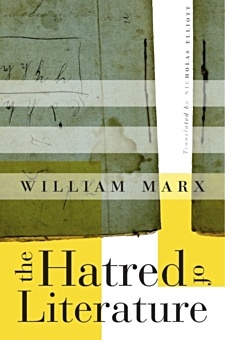 From Plato to C. P. Snow to Nicolas Sarkozy, literature’s haters have questioned the value of literature—its truthfulness, virtue, and usefulness—and have attempted to demonstrate its harmfulness.
From Plato to C. P. Snow to Nicolas Sarkozy, literature’s haters have questioned the value of literature—its truthfulness, virtue, and usefulness—and have attempted to demonstrate its harmfulness.
Literature does not start with Homer or Gilgamesh, William Marx says, but with Plato driving the poets out of the city, like God casting Adam and Eve out of Paradise. That is its genesis. From Plato the poets learned for the first time that they served not truth but merely the Muses. It is no mere coincidence that the love of wisdom (philosophia) coincided with the hatred of poetry. Literature was born of scandal, and scandal has defined it ever since.
In the long rhetorical war against literature, Marx identifies four indictments—in the name of authority, truth, morality, and society. This typology allows him to move in an associative way through the centuries. In describing the misplaced ambitions, corruptible powers, and abysmal failures of literature, anti-literary discourses make explicit what a given society came to expect from literature. In this way, anti-literature paradoxically asserts the validity of what it wishes to deny. The only threat to literature’s continued existence, Marx writes, is not hatred but indifference.
William Marx is Professor of Comparative Literature at the University of Paris Nanterre.
The Hatred of Literature
William Marx
Translated by Nicholas Elliott
Belknap Press
Harvard University Press
ISBN 9780674976122
Publ.: January 2018
Hardcover
240 pages
€27.00
# new books
William Marx – The Hatred of Literature
fleursdumal.nl magazine
More in: - Book News, - Book Stories, Archive M-N, Art & Literature News, MONTAIGNE, The Art of Reading, The talk of the town
Delphine Lecompte (1978) debuteerde in 2004 in het Engels met de roman Kittens in the Boiler, daarna schakelde ze over naar gedichten in haar moedertaal.
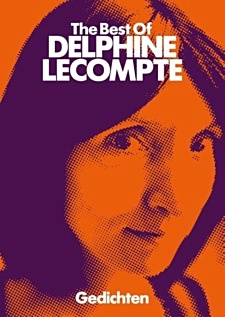 Voor haar debuutbundel De dieren in mij kreeg ze de C. Buddingh’-prijs 2010 en de Prijs Letterkunde 2011 van de Provincie West-Vlaanderen. Haar vorige bundel Dichter, bokser, koningsdochter werd genomineerd voor de VSB Poëzieprijs.
Voor haar debuutbundel De dieren in mij kreeg ze de C. Buddingh’-prijs 2010 en de Prijs Letterkunde 2011 van de Provincie West-Vlaanderen. Haar vorige bundel Dichter, bokser, koningsdochter werd genomineerd voor de VSB Poëzieprijs.
Het oeuvre van Delphine Lecompte vormt een ontembaar en onvoorspelbaar universum. In inmiddels zeven bundels bevraagt ze volstrekt genadeloos en vol branie zichzelf, de wereld en de poëzie.
Nu is het tijd voor een Best Of, waarin alle incestueuze imkers, gekwelde touwslagers, pedofiele tuinmannen, norse walvisjagers, morose windhondenfokkers, verwaarloosde hoefdieren, onbereikbare moeders en de geliefde oude kruisboogschutter een nieuw verband met elkaar aangaan. Ze bevolken een wereld die vol is van woede en gekte, maar ook van bezinning, verliefdheid en troost.
Best of Delphine Lecompte
Auteur: Delphine Lecompte
Taal: Nederlands
Poëzie
Uitgever: De Bezige Bij
Druk 1e druk
Omslagontwerp Moker Ontwerp
Foto auteur Koen Broos
Vormgeving binnenwerk Aard Bakker
Druk Bariet Ten Brink, Meppel
isbn 978 94 031 3720 9
nur 306
Afmetingen 24 x 17 x 1,2 cm
128 pagina’s
Paperback
November 2018
€ 19,99
# new books
Best of Delphine Lecompte
Poëzie
fleursdumal.nl magazine
More in: #Editors Choice Archiv, - Book News, - Bookstores, Archive K-L, Art & Literature News, Lecompte, Delphine
“Über Nacht war ich Winnetou!” ist für alle Filmfans ein wahrer Schatz: Drei Jahre nach dem Tod ihres Mannes Pierre Brice zeigt seine Frau Hella das über 50 Jahre lang behütete und zum Großteil unveröffentlichte private Fotomaterial des Winnetou-Schauspielers, entstanden am Rande der Dreharbeiten zu den Winnetou-Filmen.

Ergänzt werden diese Aufnahmen neben zahlreichen weiteren Fotos aus den Winnetou-Filmen unter anderem durch persönliche Briefe, Postkarten, Verträge und Vereinbarungen.
Persönliche Dokumente Pierre Brice’ runden diese einzigartige Sammlung von Memorabilia über einen der beliebtesten und populärsten Schauspieler der letzten 55 Jahre ab.
Pierre-Brice-Edition “Über Nacht war ich Winnetou!”
von Hella Brice
1960er Jahre – Dreharbeiten der Karl-May-Filme. ‘Pierre Brice-Edition’.
Fans von Pierre Brice, Karl May oder Filmen allgemein
Buch (gebunden)
223 Seiten
ISBN: 3780231018
EAN: 9783780231017
21, 4 cm / 30, 2 cm / 2, 0 cm ( B/H/T ).
Karl-May-Verlag
12. Oktober 2018
€ 39,00
# new books
Karl-May-Filme
Pierre Brice-Edition
fleursdumal.nl magazine
More in: - Book News, - Bookstores, Archive A-B, Archive M-N, Art & Literature News, AUDIO, CINEMA, RADIO & TV, Cowboys and Indians, Karl May
A writer who defies categorization, Daniil Kharms has come to be regarded as an essential artist of the modernist avant-garde.
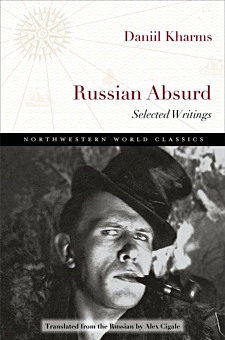 His writing, which partakes of performance, narrative, poetry, and visual elements, was largely suppressed during his lifetime, which ended in a psychiatric ward where he starved to death during the siege of Leningrad.
His writing, which partakes of performance, narrative, poetry, and visual elements, was largely suppressed during his lifetime, which ended in a psychiatric ward where he starved to death during the siege of Leningrad.
His work, which survived mostly in notebooks, can now be seen as one of the pillars of absurdist literature, most explicitly manifested in the 1920s and ’30s Soviet Union by the OBERIU group, which inherited the mantle of Russian futurism from such poets as Vladimir Mayakovsky and Velimir Khlebnikov.
This selection of prose and poetry provides the most comprehensive portrait of the writer in English translation to date, revealing the arc of his career and including a particularly generous selection of his later work.
DANIIL KHARMS (1905–1942) was a major figure in twentieth-century Russian and Soviet literature. An enigmatic and genre-bending artist, he was among the most significant voices in what came to be known as the literature of Russian absurdism.
ALEX CIGALE was awarded an NEA Literary Translation Fellowship in 2015. His translations from Russian and his original poetry in English have appeared in such journals as the New England Review, PEN America, TriQuarterly, and World Literature Today.
“…lively and funny… a profound and subtle testament to Kharms.” —Times Literary Supplement
Daniil Kharms:
Russian Absurd.
Selected Writings
Translated from the Russian by Alex Cigale
Northwestern World Classics
Poetry
February 2017
ISBN 978-0-8101-3457-7
280 pages
Trade Paper
$24.95
# new books
Russian Absurd
Selected Writings
Daniil Kharms;
Translated from the Russian by Alex Cigale
fleursdumal.nl magazine
More in: #Biography Archives, - Book News, Archive K-L, Archive K-L, Art & Literature News, Constructivism, Futurisme, Kharms (Charms), Daniil
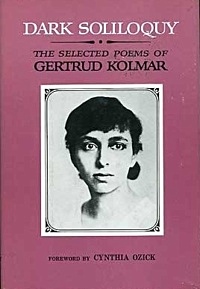
Sehnsucht
Ich denke dein,
Immer denke ich dein.
Menschen sprachen zu mir, doch ich achtet es nicht.
Ich sah in des Abendhimmels tiefes Chinesenblau, daran
der Mond als runde gelbe Laterne hing,
Und sann einem anderen Monde, dem deinen, nach,
Der dir glänzender Schild eines ionischen Helden vielleicht
oder sanfter goldener Diskus eines erhabenen Werfers wurde.
Im Winkel der Stube saß ich dann ohne Lampenlicht,
tagmüde, verhüllt, ganz dem Dunkel gegeben,
Die Hände lagen im Schoß, Augen fielen mir zu.
Doch auf die innere Wand der Lider war klein und unscharf
dein Bild gemalt.
Unter Gestirnen schritt ich an stilleren Gärten, den Schatten-
rissen der Kiefern, flacher, verstummter Häuser,
steiler Giebel vorbei
Unter weichem düsteren Mantel, den nur zuweilen
Radknirschen griff, Eulenschrei zerrte,
Und redete schweigend von dir, Geliebter, dem lautlosen,
dem weißen mandeläugigen Hunde, den ich geleitete.
Verschlungene in ewigen Meeren ertrunkene Nächte!
Da meine Hand in den Flaum deiner Brust sich bettete
zum Schlummer,
Da unsere Atemzüge sich mischten zu köstlichem Wein,
den wir in Rosenquarzschale darboten unserer Herrin,
der Liebe,
Da in Gebirgen der Finsternis die Druse uns wuchs und
reifte, Hohlfrucht aus Bergkristallen und fliedernen
Amethysten,
Da die Zärtlichkeit unsere Arme Feuertulpen
porzellanblaue Hyazinthen aus welligen, weiten, ins
Morgersgraun reichenden Schollen rief,
Da, auf gewundenem Stengel spielend, die halberschlossene
Knospe des Mohns wie Natter blutrot über uns züngelte,
Des Ostens Balsam- und Zimmetbäume mit zitterndem
Laube um unsere Lager sich hoben
Und purpurne Weberfinken unserer Munde Hauch in
schwebende Nester verflochten. –
Wann wieder werden wir in des Geheimnisses Wälder fliehn,
die, undurchdringlich, Hinde und Hirsch vor dem
Verfolger schützen?
Wann wieder wird mein Leib deinen hungrig bittenden
Händen weißes duftendes Brot, wird meines Mundes
gespaltene Frucht deinen dürstenden Lippen süß sein?
Wann wieder werden wir uns begegnen?
Innige Worte gleich Samen von Wurzkraut und Sommer-
blumen verstreun
Und beglückter verstummen, um nur die singenden
Quellen unseres Blutes zu hören?
(Fühlst du, Geliebter, mein kleines horchendes Ohr, ruhend
an deinem Herzen?)
Wann wieder werden im Nachen wir gleiten unter zitronfarbnem
Segel,
Von silbrig beschäumter, tanzender Woge selig gewiegt,
Vorüber an Palmen, die grüner Turban schmückt wie den
Sproß des Propheten,
Den Saumriffn ferner Inseln entgegen, Korallenbänken,
an denen du scheitern willst?
Wann wieder, Geliebter . . . wann wieder . . ? . .
Nun sintert mein Weg
Durch Ödnis. Dorn ritzt den Fuß.
Bäche, frische, erquickende Wasser, murmeln; aber ich finde
sie nicht.
Datteln schwellen, die ich nicht koste. Meine verschmachtende
Seele
Flüstert ein Wort nur, dies einzige:
»Komm. . .«
O komm …
Gertrud Kolmar
(1894-1943)
Gedicht: Sehnsucht
fleursdumal.nl magazine
More in: Archive K-L, Archive K-L, Kolmar, Gertrud
“The staggering thing about a life’s work is it takes a lifetime to complete,” Craig Morgan Teicher writes in these luminous essays.
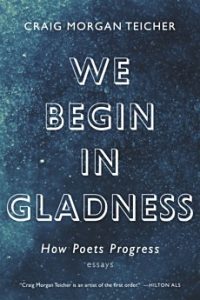 We Begin in Gladness considers how poets start out, how they learn to hear themselves, and how some offer us that rare, glittering thing: lasting work. Teicher traces the poetic development of the works of Sylvia Plath, John Ashbery, Louise Glück, and Francine J. Harris, among others, to illuminate the paths they forged—by dramatic breakthroughs or by slow increments, and always by perseverance.
We Begin in Gladness considers how poets start out, how they learn to hear themselves, and how some offer us that rare, glittering thing: lasting work. Teicher traces the poetic development of the works of Sylvia Plath, John Ashbery, Louise Glück, and Francine J. Harris, among others, to illuminate the paths they forged—by dramatic breakthroughs or by slow increments, and always by perseverance.
We Begin in Gladness is indispensable for readers curious about the artistic life and for writers wondering how they might light out—or even scale the peak of the mountain.
Though it seems, at first, like an art of speaking, poetry is an art of listening. The poet trains to hear clearly and, as much as possible, without interruption, the voice of the mind, the voice that gathers, packs with meaning, and unpacks the language the poet knows.
It can take a long time to learn to let this voice speak without getting in its way. This slow learning, the growth of this habit of inner attentiveness, is poetic development, and it is the substance of the poet’s art. Of course, this growth is rarely steady, never linear, and is sometimes not actually growth but diminishment—that’s all part of the compelling story of a poet’s way forward. —from the Introduction
Craig Morgan Teicher is an acclaimed poet and critic. He is the author of We Begin in Gladness: How Poets Progress, and three books of poetry, including The Trembling Answers, winner of the Lenore Marshall Poetry Prize, and he regularly writes reviews for Los Angeles Times, NPR, and the New York Times Book Review. He lives in New Jersey.
We Begin in Gladness.
How Poets Progress
by Craig Morgan Teicher
Publication Date 11/6/18
Format: Paperback
ISBN 978-1-55597-821-1
Subject: Literary Criticism
Pages 176
Graywolf Press
$16.00
# new books
more info: http://craigmorganteicher.com/
How Poets Progress
fleursdumal.nl magazine
More in: - Book Lovers, - Book Stories, Archive S-T, Archive S-T, Art & Literature News, Sylvia Plath, The Art of Reading
Nu Mels zelf grootvader is, lijkt het soms of hij zijn leven heeft gedroomd. Net als zijn moeder. Hij weet nog hoe ze zong terwijl ze frambozen plukte. Hij twijfelt aan de waarheid van de dingen die hij zich herinnert. Soms bleken ze achteraf heel anders. Hij herinnerde zich zijn vader als een groot man tegen wie hij opkeek, maar toen hij later in de kast de overjas van zijn vader vond en hem paste, bleek die hem te klein.
 En zijn moeder? Was ze echt zo meisjesachtig? Jammer dat hij geen foto’s van haar heeft zoals hij zich haar herinnert, haar mond rood van frambozensap. Alle foto’s die hij van haar heeft zijn in zwart-wit.
En zijn moeder? Was ze echt zo meisjesachtig? Jammer dat hij geen foto’s van haar heeft zoals hij zich haar herinnert, haar mond rood van frambozensap. Alle foto’s die hij van haar heeft zijn in zwart-wit.
Daardoor missen ze ook de geuren die bij haar hoorden. Rijp fruit. Gras. Appelgebak. Hij bewaart een paar foto’s van haar in zijn portefeuille, samen met die van Tijger en Thija. Hij haalt ze te voorschijn, zoals hij bijna elke dag even doet. Zijn moeder, lachend, op het weitje achter het huis waar ze de was te bleken legt, een beetje verrast door de fotograaf. Was dat zijn vader geweest? Of haar eigen vader, grootvader Bernhard?
Een andere foto toont haar op haar paasbest, samen met zijn vader, in het zwart, de voordeur achter zich dichttrekkend. Op weg naar de kerk. In dat grijs is ze veel te deftig voor de moeder uit zijn herinnering. De zondagse kleren zitten haar zelfs op de foto onwennig. Na de mis gooide ze die altijd direct uit, om wat luchtigs aan te trekken, om de bossen in te gaan, samen met Mels en vaak ook met Tijger en Thija. Maar altijd zonder vader. Die zat op zondag in zijn zwarte kleren deftig zondags te wezen in het café.
Of gewoon in de kamer, slapend in zijn stoel. Niet voor niets was hij een zoon van grootvader Rudolf. Hij stond stijf van de regels.
Een foto waar ze allemaal op staan: grootvader Bernhard, moeder, Thija, Tijger en hijzelf. Geen vader. Allemaal tot de knieën in een zee van gras aan de oever van de Wijer. Toen was zijn vader er nog. De foto moet door hem genomen zijn. Hij moet nog hebben geprobeerd de compositie van de foto te redden, maar daarbij heeft hij het hele groepje een beetje scheef gefotografeerd.
Of misschien was hij gewoon dronken, zoals vaak op zondag. De Wijer stroomt in de richting van de brug een beetje omhoog, net alsof ze allemaal wankel staan. Thija staat vooraan, met opgeschorte jurk, bang dat haar onderrok onder het stuifmeel van de oeverlelies komt te zitten. Haar benen dun, maar sterk. Alles aan haar is sterk. Haar lach, haar houding. Hoe klein en spichtig ze ook is, niemand is altijd en overal zo nadrukkelijk aanwezig als zij. Tijger staat naast haar, een arm om haar hals. Hij trekt haar een beetje naar zich toe. Zelf staat Mels vlak bij zijn moeder, die troostend een hand op zijn schouder legt.
Een foto van Tijger alleen, stoer, in starthouding op zijn fiets, als op een motor.
En de adembenemend mooie foto van Thija op de dag van haar plechtige communie. Voor de bloementuin van de kerk. In haar roze jurk, die zelfs op de zwartwitfoto, in de speciale tint grijs, laat zien hoe roze die is. In haar hand draagt ze een boeket van margrieten en Gipskruid, in haar andere hand het nieuwe missaal. Haar ogen staan groot, maar voor haar doen wat verlegen. Ze vertolkt de hoofdrol in een toneelstuk. Het hele dorp was erbij toen alle communicanten, een voor een, door de fotograaf werden gekiekt, allemaal in dezelfde houding, voor de bloementuin tussen de kerk en de pastorie.
Nog altijd herinnert Mels zich dat moment. Hoe stil het werd; het was al stil toen ze naar de plek liep. De ogen waarmee ze naar de fotograaf keek, haar grote wat verbaasde ogen. Het bleef maar duren. Ze trok het toneelstuk helemaal naar zich toe. Maar de fotograaf moest verder. Andere meisjes stonden te dringen.
Mels weet nog precies hoe het was; hoe ze hem heel even aankeek. Maar later zei Tijger dat ze naar hem had gekeken en zo had iedereen gedacht dat ze naar hem of naar haar keek, zelfs zijn moeder.
Hij stopt de foto’s terug in de portefeuille en kijkt uit over de Wijer die er, vanaf dit punt gezien, nog net zo bij ligt als een halve eeuw geleden.
Ton van Reen: Het diepste blauw (080)
wordt vervolgd
fleursdumal.nl magazine
More in: - Book News, - Het diepste blauw, Archive Q-R, Reen, Ton van
Absurdités, dérives, abus et même maltraitances ont jalonné l’histoire de la folie.
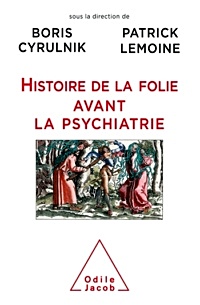 Comment comprendre autrement le succès de Mesmer et de son baquet ? Comment rendre compte de l’attribution à Saturne des troubles de l’humeur et au démon des tourments de l’âme ? Comment justifier l’enfermement psychiatrique des dissidents sous Staline ?
Comment comprendre autrement le succès de Mesmer et de son baquet ? Comment rendre compte de l’attribution à Saturne des troubles de l’humeur et au démon des tourments de l’âme ? Comment justifier l’enfermement psychiatrique des dissidents sous Staline ?
Entourés d’une dizaine d’experts – des psychiatres mais aussi une historienne, un interniste ou un neurologue – Patrick Lemoine et Boris Cyrulnik débattent du passé de la psychiatrie. Ils nous proposent de nous concentrer sur quelques questions très actuelles et pour le moins épineuses : quelle nécessité de fonder une nouvelle psychiatrie aujourd’hui, et quel avenir pour cette discipline, longtemps branche folle de la médecine ?
Boris Cyrulnik est neuropsychiatre et directeur d’enseignement à l’université de Toulon. Il est l’auteur de très nombreux ouvrages qui ont tous été des best-sellers, parmi lesquels, tout récemment, Psychothérapie de Dieu qui est un immense succès.
Patrick Lemoine est psychiatre. Spécialiste du sommeil, docteur en neurosciences, professeur associé à l’Université de Pékin, il a publié plus d’une trentaine d’ouvrages, parmi lesquels Le Mystère du placebo.
Avec Patrick Clervoy, Jean Furtos, Jacques Hochmann, Danielle Jacquart, Pierre Lamothe, Pierre Lemarquis, Stéphane Mouchabac, Gérard Ostermann.
Boris Cyrulnik & Patrick Lemoine
Histoire de la folie avant la psychiatrie
Édition brochée
12 septembre 2018
256 pages
EAN13 : 9782738145130
145 x 220 mm
Éditions Odile Jacob
€ 23.90
# new books
Boris Cyrulnik & Patrick Lemoine
fleursdumal.nl magazine
More in: - Book News, - Book Stories, Archive C-D, Archive K-L, Psychiatric hospitals
For the bicentennial of its first publication, Mary Shelley’s original 1818 text, introduced by National Book Critics Circle award-winner Charlotte Gordon. Nominated as one of America’s best-loved novels by PBS’s The Great American Read.
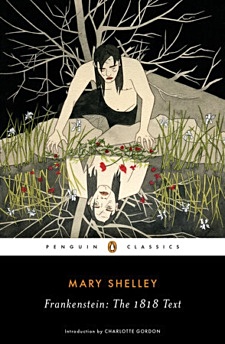 2018 marks the bicentennial of Mary Shelley’s seminal novel. For the first time, Penguin Classics will publish the original 1818 text, which preserves the hard-hitting and politically-charged aspects of Shelley’s original writing, as well as her unflinching wit and strong female voice. This edition also emphasizes Shelley’s relationship with her mother—trailblazing feminist Mary Wollstonecraft, who penned A Vindication of the Rights of Woman—and demonstrates her commitment to carrying forward her mother’s ideals, placing her in the context of a feminist legacy rather than the sole female in the company of male poets, including Percy Shelley and Lord Byron.
2018 marks the bicentennial of Mary Shelley’s seminal novel. For the first time, Penguin Classics will publish the original 1818 text, which preserves the hard-hitting and politically-charged aspects of Shelley’s original writing, as well as her unflinching wit and strong female voice. This edition also emphasizes Shelley’s relationship with her mother—trailblazing feminist Mary Wollstonecraft, who penned A Vindication of the Rights of Woman—and demonstrates her commitment to carrying forward her mother’s ideals, placing her in the context of a feminist legacy rather than the sole female in the company of male poets, including Percy Shelley and Lord Byron.
This edition includes a new introduction and suggestions for further reading by National Book Critics Circle award-winner and Shelley expert Charlotte Gordon, literary excerpts and reviews selected by Gordon, and a chronology and essay by preeminent Shelley scholar Charles E. Robinson.
Mary Shelley: The daughter of Mary Wollestonecraft, the ardent feminist and author of A Vindication on the Right of Women, and William Godwin, the radical-anarchist philosopher and author of Lives of the Necromancers, Mary Goodwin was born into a freethinking, revolutionary household in London on August 30,1797. Educated mainly by her intellectual surroundings, she had little formal schooling and at 16 eloped with the young poet Percy Bysshe Shelley; they eventually married in 1816. Mary Shelley’s life had many tragic elements. Her mother died giving birth to Mary; her half-sister committed suicide; Harriet Shelley (Percy’s wife) drowned herself and her unborn child after he ran off with Mary. William Godwin disowned Mary and Shelley after their elopement, but—heavily in debt—recanted and came to them for money; Mary’s first child died soon after its birth; and in 1822 Percy Shelley drowned in the Gulf of La Spezia—when Mary was not quite 25. Mary Shelley recalled that her husband was “forever inciting” her to “obtain literary reputation.” But she did not begin to write seriously until the summer of 1816, when she and Shelley were in Switzerland, neighbor to Lord Byron. One night following a contest to compose ghost stories, Mary conceived her masterpiece, Frankenstein. After Shelley’s death she continued to write Valperga (1823), The Last Man (1826), Ladore (1835), and Faulkner (1837), in addition to editing her husband’s works. In 1838 she began to work on his biography, but owing to poor health she completed only a fragment. Although she received marriage proposals from Trelawney, John Howard Payne, and perhaps Washington Irving, Mary Shelley never remarried. “I want to be Mary Shelley on my tombstone,” she is reported to have said. She died on February 1, 1851, survived by her son, Percy Florence.
For more than seventy years, Penguin has been the leading publisher of classic literature in the English-speaking world. With more than 1,800 titles, Penguin Classics represents a global bookshelf of the best works throughout history and across genres and disciplines. Readers trust the series to provide authoritative texts enhanced by introductions and notes by distinguished scholars and contemporary authors, as well as up-to-date translations by award-winning translators.
Frankenstein: The 1818 Text
By Mary Shelley
Introduction by Charlotte Gordon
Contribution by Charlotte Gordon
Fiction Classics
Paperback
Penguin Random House
Published by Penguin Classics
Jan 16, 2018
288 Pages
ISBN 9780143131847
$10.00
# new books
Frankenstein – Mary Shelley
fleursdumal.nl magazine
More in: - Book Lovers, - Book News, Archive S-T, Art & Literature News, Mary Shelley, Shelley, Mary, Tales of Mystery & Imagination
Thank you for reading Fleurs du Mal - magazine for art & literature